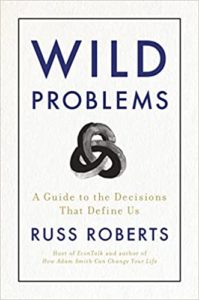In Russ Roberts’ wonderful new book Wild Problems, he offers a great deal of insight into the limits of algorithmic or rational decision making as traditionally understood by economists and other social scientists. Early on, he describes how some great minds attempted to deal with major life choices by making a list of pros and cons and weighing them against each other. This section really spoke to me and my experience, because it reminded me of my own attempt to make a major decision this way.
Several years ago, my wife and I were looking to buy a house. It would be our first time doing so, and we knew that it was a big decision we’d never made before. Luckily, we thought, we were ready, because we’d gotten data! Well before we were seriously searching for a home, we would make a habit of touring open house events. At each house, our goal was to simply notice our reactions to various features. What did we like? What did we dislike? Was the reaction strong or weak? We would compare notes after each house, and find common points.
We took all this information and wrote out a master checklist. We didn’t just have pros and cons – we had subcategories for each. Items in the pro list could be categorized as a must-have feature, or a nice-to-have feature, or something to be added in later if missing, and so on. Similarly, on the negative side, there were deal breakers, or things to avoid if possible, features that can be removed, or minor annoyances but workable, and so on. Pros and cons were put into their various categories, they were ranked in order within those categories, and then, for good measure, each data point assigned a value of one to ten. With all this data gathering and analysis, surely our first home purchase went swimmingly. Right?
As you’ve probably guessed, no, it did not. Within months, we realized we had made a bad choice. We stayed in that house for a few years before selling it and moving on. Our attempt to use lists and ranking to make a good decision was a total failure. But why? There are a few things we have since come to realize.
First, expectations are no substitute for experience. Unfortunately, experience comes as a result of your decisions- after you make them. Having never bought a house before, our list could only show what we expected to enjoy or dislike. But expectations aren’t always met. Some things you thought would be major selling points at first turn out to not matter much, and some things which you expected to be at worst minor annoyances can turn out to be deal breakers in practice. It’s only after you experience these things when you find out which is which.
On a closely related point, not all experiences are transferable. I’ve lived in a wide variety of places in my life. Trailers, brutalist concrete barracks, dumpy apartments, decent apartments, and for one very nice stretch, a condo on the waterfront of a North Carolina beach. I thought this wide variety of living conditions gave me plenty of insight into what I would want from living as a homeowner as well, but I was simply wrong about that.
Another issue is one of radical ignorance – the things you don’t know that you don’t know. There were things about the house which we realized should have been on the con list, but simply never occurred to us. Nor were they things we could feasibly have noticed or learned about by simply touring open houses. It’s only in the process of living in a space that you come to discover these things. A pro and con list can only show you what’s occurred to you to put down on the list. All the things that haven’t occurred to you to list, good or bad, will never be reflected. And you can’t know how large that hidden list is, even in principle, because some of the items which should be on it don’t exist yet. They will only come to exist in your future experience.
One more complication is that you can’t know what the future will bring. One thing my wife liked was the yard space – it had a lot of potential for gardening. She had visions of building a beautiful garden, a place where she could spend spring mornings reading a book and sipping on coffee and enjoying the sunshine. And it very nearly worked out that way. What we didn’t know, and couldn’t have known, is that around the same time her garden was coming to fruition, a new neighbor would move in directly across the street who owned perhaps the loudest lawn equipment in the history of mankind and seemed to be under the impression that lawns needed to be mowed on a near daily basis. Almost without fail, every attempt to enjoy a quiet morning in the garden would be met with the overpowering sound of a gas-powered lawn mower or leaf blower.
So, was buying that home a mistake? In Russ Roberts’ framework, the answer is no, not really. As he says towards the end of his book, there’s a difference between making a mistake and making a choice that just doesn’t work out. Sometimes your decisions don’t work out as you hoped they would, for reasons you simply couldn’t have known. That’s not making a mistake, it’s just an experience of the human condition. Our home buying experience gave us an insight into how often some choices can turn on the roll of the dice, in ways you can’t anticipate. And I’m glad it did. What if instead, everything had worked out exactly as we had hoped? We might have been left with the impression that we had nailed the home buying algorithm, never knowing how much of our apparent success was down to simple luck. The experience we gained left us a little wiser, and gave us a better appreciation of how expectations and experience can collide. And in the end, isn’t that a better, more enriching outcome?
Kevin Corcoran is a Marine Corps veteran and a consultant in healthcare economics and analytics and holds a Bachelor of Science in Economics from George Mason University.



READER COMMENTS
Monte
Aug 22 2022 at 5:45pm
In behavioral economics jargon, your decision to purchase was a result of unbounded rationality (a decision based on all available information). What further defense against a bad choice can any of us offer? After all, hindsight is 50/50 (according to former Panthers quarterback Cam Newton).
Perhaps a decision to rent or lease-to-own might have worked out better in the long run, which presents an interesting analogy. Should couples cohabitate before marriage to improve their odds against divorce? Most of us seem to believe so, but the available research doesn’t appear to support that belief. This 2018 study showed that “cohabitation before marriage was associated with a lower risk of divorce in the first year of marriage but a higher risk thereafter.”
But just as I might choose to cohabitate before marriage, I might also choose to rent or lease-to-own a home before purchasing it. This seems like a safe enough heuristic to rely on before buying or marrying a brick house.
WJK
Aug 24 2022 at 4:46pm
It’s not necessarily a surprise that cohabiting before marriage doesn’t reduce divorce rates — the conditioning could go either way. Presumably, cohabitation is an optional test of partnership instability that tends to be preferentially administered in cases with greater prior risk. Somebody who tests negative for a disease is less likely to have it than somebody who tests positive, but might be *more* likely to have it than somebody who was never tested because they never presented any suspicious symptoms in the first place — it’s all about base rates. Cohabiting may not *cause* divorce any more than testing causes the disease.
MarkW
Aug 22 2022 at 6:34pm
I might also choose to rent or lease-to-own a home before purchasing it.
But chances are that you couldn’t. Most people wanting to sell a house wouldn’t be willing to lease for a trial year, and most landlords wouldn’t want to sell the house at the end of a lease. And even if you could lease before buying, your experience would be different. People moving into a house usually want to make changes that as a tenant you wouldn’t want (or be able) to do.
Monte
Aug 22 2022 at 7:35pm
I guess it depends on the circumstances. I just googled a search for rent-to-own homes where I live that generated 711 listings, so inventory is not an issue. Rent-to-own is an excellent option if you’re an aspiring homeowner financially unwilling or unable to commit for the present, or if you’re new to an area that you may, or may not, decide you like long term. It’s true that no permanent changes (remodeling, additions, etc.) can be made with a rent-to-own property, but these types of decisions are usually made long after renters choose to exercise the option to purchase.
TMC
Aug 23 2022 at 10:14am
“The experience we gained left us a little wiser, and gave us a better appreciation of how expectations and experience can collide. And in the end, isn’t that a better, more enriching outcome?”
I’m not sure about this. Sometimes you’re better off lucky than good.
Walter Boggs
Aug 23 2022 at 2:46pm
As the saying goes, you don’t buy a house; you buy a house kit. You’re probably better off thinking of it that way from the start.
Comments are closed.